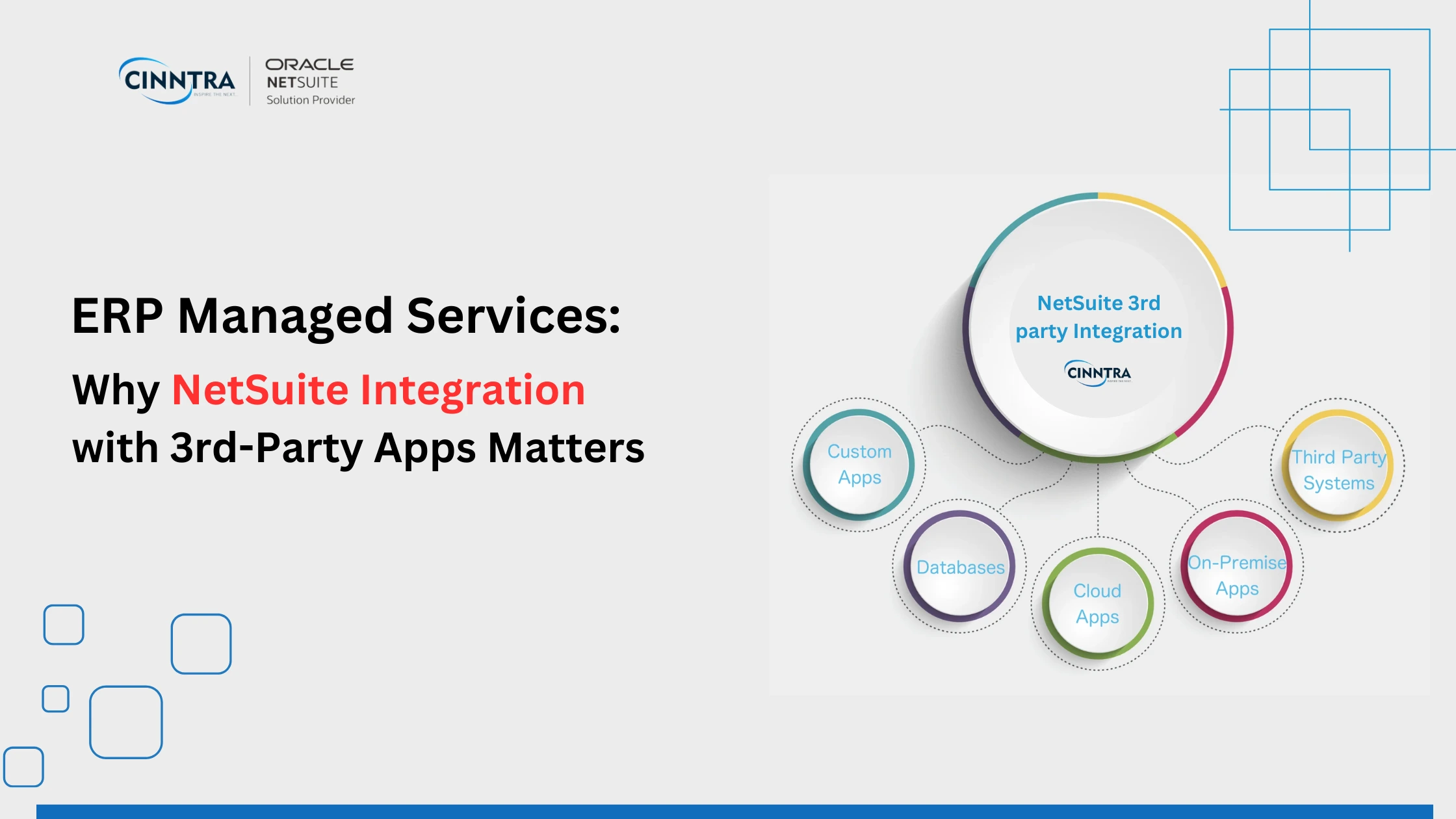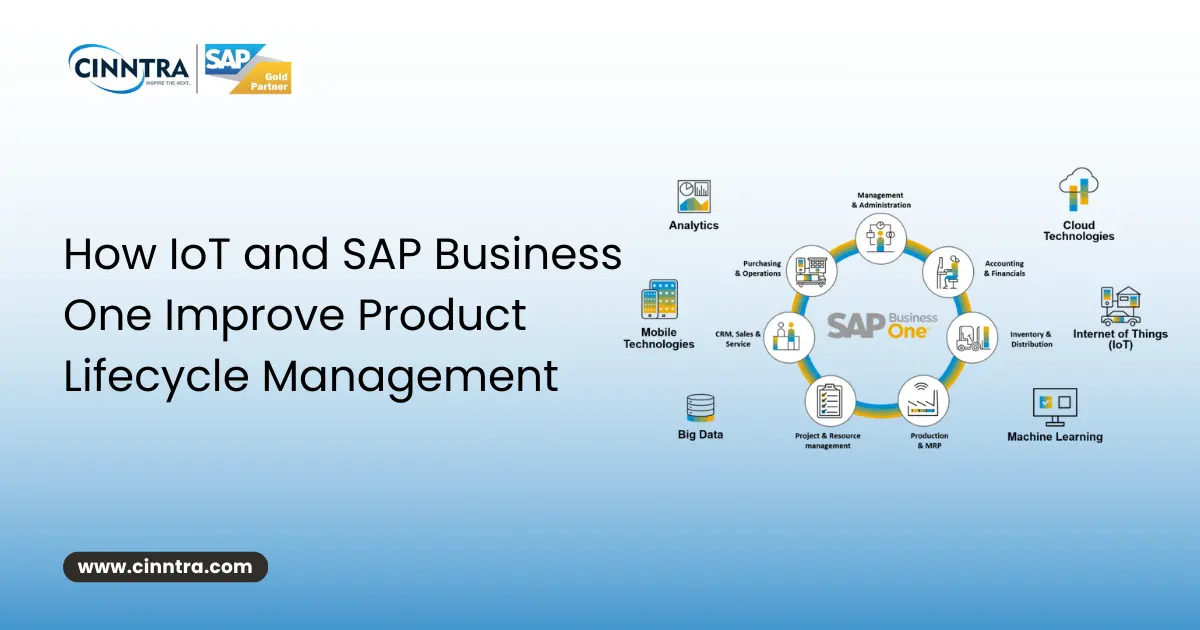ERP Managed Services: Why NetSuite Integration with 3rd-Party Apps Matters

"If your business is struggling with fragmented software systems, manual data entry, or scaling challenges, integrating NetSuite with the right third-party apps could be the game changer for you."
Although NetSuite is an effective standalone application, its integration with other third-party applications significantly maximizes net gains. This not only extends its capabilities, but also fills operational gaps, and cultivates an environment specific to the organization’s unique goals and workflows.
Business Challenges Solved with NetSuite Integration Services
1. Bridging Functional Gaps
NetSuite has comprehensive capabilities in such areas as finance, inventory, and even CRM, but unfortunately, no single solution meets every business’s unique needs. Businesses can bridge these gaps with third-party integrations. These integrations can include marketing automation tools like HubSpot, e-commerce platforms such as Shopify, and advanced analytics software like Tableau.
The same logic applies when integrating NetSuite with Salesforce as your customer relationship management (CRM) tool, as you gain a single comprehensive view of customer data which allows sales staff to truly sell and offer personalized services.
A study shows that integrated system users improve operational efficiency by 30-40% when compared to other users who depend on fragmented tools.
2. Scaling Smarter, Not Harder
With the expansion of business comes the changing of operational requirements, leading to evolution. A closed-off ERP system could prove problematic, but using NetSuite along with third-party applications can help.
For instance, an e-commerce business expanding on a global level may need integration with different payment systems, tax regulations, and multi-currency transactions. With these tools, business scaling becomes simple, eliminating the need to change current systems.
3. Ensuring Data Accuracy and Consistency
Inaccuracies in data are a common occurrence in many systems due to the high level of manual data entry. By integrating NetSuite with other external systems, businesses can automatically update data on different platforms, which enables high accuracy and consistency across all applications.
Studies show that companies that automate their data workflow processes are likely to save 40% of time engaged in processes and save a lot of time engaged in manual reconciliation of the data.
4. Innovate to Dominate
The integration of third-party applications enables organizations to integrate advanced technologies like AI, machine learning, and the Internet of Things. For example, linking NetSuite with an AI-powered analytics tool can improve the accuracy of customer activity projections, thus enabling the business to respond appropriately to the changing conditions of a marketplace.
The Role of ERP Managed Services in NetSuite Integration
-
Making Difficult Integrations Easier
Integrating NetSuite with third-party systems can be challenging, especially for businesses lacking in-house IT staff. This is where ERP Managed Services come in handy because they resolve the complexity associated with the integration by fully managing the resource needs from the planning and implementation to the day-to-day servicing and optimization.
For example, a managed service provider can help with the integration by configuring APIs, installing middleware, and facilitating secure data transfer between NetSuite and other applications. They also provide advanced monitoring services to resolve problems before they affect the business.
2. Security and Compliance Issues
Data safety is a priority, especially when using third-party applications with NetSuite ERP. The use of encryption, access control, two-factor verification, regular security audits, and other sensitive information can be protected with more advanced techniques. In addition, they ensure their policies are within the bounds of GDPR, HIPAA, and SOX not to get legal fines.
3. Cut Costs, Boost Value
In-house teams tend to be very costly with running and supervising employees as well as NetSuite integration. Alongside these issues, ERP Managed Services tackles this specific concern by offering affordable options with accessible employees and modern tools instead of consulting, hiring, or needing to train someone.
NetSuite Implementation Services: The Foundation of Successful Integration
NetSuite implementation services guarantee your business has everything set up properly before integrating any third-party applications. Proper configurations will streamline every integration process as well as meet your business requirements, and that is exactly where NetSuite services come into play.
1. Customization and Configuration
Your business is unique, and the workflow that your business follows is also unique. With these services, you are able to automate a lot of repetitive tasks, set specific user roles, and create custom dashboards that work best for you.
2. Data Migration
Switching data from a legacy system to NetSuite has always been a challenging process. With implementation services, your data will be properly formatted and seamlessly transitioned over to NetSuite. All duplicates and inconsistencies are eliminated through a process known as Data Cleansing, which can elevate the overall quality of your data.
3. Training and Support
Technology is great, but people are what make a successful business. Your team is trained effectively so they can use the platform smartly which further prolongs the need for ongoing support.
4. Deployment Acceleration
In the context of a new ERP system, every second counts. With implementation services, one can reduce the time taken to a ‘go live’ status. As stated by Oracle, 50% companies are willing to consider on premise ERP to save time and manage work independently.
Key Considerations for NetSuite Integration with 3rd-Party Apps
1. Using Proper Tools for Integration
Failure to use the right tools can result in ineffective integration. Middleware platforms such as Dell Boomi, MuleSoft, and Celigo can greatly ease the challenge by providing basic ready-made connectors and templates. Such tools offer syncing in real-time and have the ability to handle errors too.
2. Security First
For any integration-related activity, security should always be the first consideration. Data transfers should take place via encrypted connections (HTTPS/ TLS). Employees should be isolated using multi-factor authentication (MFA) and scheduled vulnerability checks should be conducted from time to time to identify and eliminate weaknesses.
3. Ensure Flexibility
Always have a donut in your pocket so that when attempting NetSuite integrations with other applications, your business culture is seamlessly aligned with planned expansion.
For example, set up the integration framework in such a way that allows flexibility to grow and additional apps without needing to change the entire integration architecture.
4. Assess Output Efficiency
After launching the integration, it is critical that the operations are checked on a continual basis. Use analytics to determine the level of data latency, error counts, system uptime, and other major metrics. Resolving issues as soon as they occur is crucial to address system disruptions.
Real-World Example: How NetSuite Integration is Transforming a Retail Businesses
The integration of third-party applications with NetSuite has changed the operations of many retail companies by making their operations seamless, improving efficiency, and elevating customer satisfaction. A few cases have been listed below.
-
The Duck Store
As the official bookstore of the University of Oregon, The Duck Store migrated from its older systems to new generation ERP in NetSuite alongside Suite Commerce Advanced and POS. Customers were pleased as the integration improved mobile shopping and reduced bounce rates. (AndersonFrank.com)
-
MAC Group Europe
MAC Group Europe had issues regarding inventory and order delays. After the integration of NetSuite, we automated their processes which minimized errors to 90%, improved revenue by 25%, and boosted on-time delivery. (WebBee)
-
Shoes For Crews
Shoes For Crews had issues with order and inventory processing. NetSuite integration resolved these issues by automating fulfillment and order accuracy alongside speeding shipment by 30%, resulting in greater business profits. (WebBee)
These examples highlight the tangible benefits of NetSuite integration with third-party apps and underscore the importance of partnering with experienced service providers.
Partner with Cinntra for Seamless NetSuite Integration
At Cinntra, we focus on NetSuite integration services that fully leverage the capabilities of the client’s ERP systems. As a reputable integration partner, we cover the entire service delivery scope from implementation, customization, and managed services to third-party app integration.
Our certified professionals guarantee that your NetSuite ecosystem is secure, scalable, and aligned with your business goals.
For businesses looking to enhance their NetSuite integration, We offer bespoke ERP-managed services that can drive truly remarkable results. Contact us today to learn more.



0 Comments